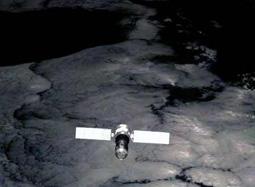
Picture released by China's manned space project on Oct. 5, 2008 shows the image of China's Shenzhou-7 spaceship, taken by a small monitoring satellite six minutes after it was released from the spaceship on Sept. 27, 2008. Launched about two hours after Chinese astronaut Zhai Zhigang finished the country's first spacewalk, the monitoring satellite has sent back over 1,000 pictures of the spaceship. The shadow on the spaceship was that of the monitoring satellite. (Xinhua Photo)

The accompanying satellite of Shenzhou-7 orbital module has accomplished its preset mission after 100 days in space, the Beijing Aerospace Control Center (BACC) said on Sunday. This achievement marks China's "preliminary mastery of satellite monitor technology," the center said.
The accompanying satellite of Shenzhou-7 orbital module has accomplished its preset mission after 100 days in space, the Beijing Aerospace Control Center (BACC) said on Sunday.
This achievement marks China's "preliminary mastery of satellite monitor technology," the center said. Since there are still some extra fuel left, the satellite will continue its flight for more scientific experiments.
After being released on Sept. 26, one day after China's third manned spacecraft was launched, the accompanying satellite was adjusted 13 times through engine ignitions so that it could focus on the orbital module of Shenzhou-7.
The center said the accompanying satellite has being flying around the orbital module in an elliptical circle, with the farthest distance of 7.6 kilometers and the nearest of 3.8 kilometers.
The satellite has sent back thousands of high-quality pictures of the orbital module, which were captured by its two cameras.
According to the center, the three Taikonauts aboard Shenzhou-7-- Zhai Zhigang, Liu Boming and Jing Haipeng -- have ended their tours across the country, and they will continue their regular training course to prepare for the establishment of China's first space station.
China successfully launched the Shenzhou-7 spacecraft on Sept.25 last year, making it the third country in the world to conduct extravehicular activity (EVA) in space following the former Soviet Union and the United States. (Xinhua)
Related News
Photos
More>>trade
- Premier urges scientists to help fight financial crisis
- CAS researchers receive TAN Jiazhen Awards for Life Sciences
- China's Think Tank Forecasts 8.3% GDP Growth in 2009
- Three Foreign Scientists Received 2008 CAS International Science and Technology
- 1:1,000,000 Geomorphologic Atlas of China to be Released





